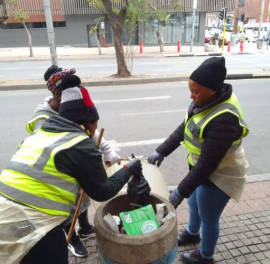
by Sihle Manda
Prince Yabo (24) is an urban ranger in Hillbrow situated at the Johannesburg central business district. Until March 2023, he spent the greater part of his day begging in the corner stores of the precinct.
This changed when he was given an opportunity to be part of the Urban Space Management (USM) initiative which cleans the streets of Hillbrow and aims to keep the area safe.
“A lot of us were just on the corner stores hustling for money and not getting what we wanted,” he said.
Yabo has been part of the USM since April 2023.
“This helped us because we are now off the streets and we are cleaning them. It is building us a lot because we are getting compliments from people who are telling us we are doing good.”
Yabo, who receives a national minimum wage from the USM initiative, said the income came when he was struggling to make a living.
Nonkululeko Hadebe, portfolio manager at USM, said the idea behind USM was that the cleaner the space, the easier it is to bring people into that area; for businesses and residences and just the general economy of the area.
“We try and assist in the management of parks. We do cleaning, safety and place-making.”
She explained that in 2016 Johannesburg inner city property owners, tenants and operators came together and formed an association called City Improvement District, which would contribute to employing people that would clean the streets.
This is how the USM initiative came to being.
City Improvement District is also a non-profit organisation operating in different areas where property owners agree to pay a levy to enhance the physical and social environment of the area.
This initiative manages 11 districts in the City of Johannesburg with Hillbrow being one of them.
Funding pumped into the USM initiative
The Industrial Development Corporation (IDC), an agency of the Department of Trade, Industry and Competition has also played a significant role in the funding of the USM initiative through its Social Employment Fund (SEF).
The IDC received R800 million in funding from the Presidential Employment Stimulus (PES) which was to be set aside for the implementation of the SEF.
Since June last year, the funding was pumped into 28 Strategic Implementing Partners (SIP) contracted to deliver on the creation of temporary work opportunities and the USM is one of the partnerships.
USM, which also manages the daily operations of City Improvement Districts in the inner city, is a beneficiary of the Johannesburg Inner City Partnership, a SIP of the SEF.
Because of the SEF funding, Yabo and 360 people within Hillbrow are employed through the USM programme and are receiving an income.
The SEF is part of the PES introduced by President Cyril Ramaphosa in October 2020 in response to devastating economic impact of the COVID-19 pandemic.
Its aim is to create jobs and strengthen livelihoods with meaningful work. The SEF offers participants 16 hours of work per week, at the national minimum wage.
Addressing Parliament in May 2023, President Ramaphosa said the PES has created nearly 650 000 work and livelihood opportunities in the past financial year.
“These opportunities were created in areas as diverse as basic education, small-scale farming, and arts and culture. Of the people involved in the programme, 83% are youth. This brings the total number of participants in the PES since its launch in 2020 to over 1.2 million people,” he said.
SEF funding making a difference
Hadebe said the funding from the SEF was making a difference in the Hillbrow area.
“Before the SEF programme, we probably had only 50 urban rangers but we have now been able to add more participants,” she said.
Hadebe explained that shop owners were saying it felt safer to operate their businesses in Hillbrow because Yabo and other participants were cleaning the area.
“The crime rate has also decreased,” she said.
Other non-government organisations can also apply with the IDC to receive PES funding for programmes that give back to the community.
During a recent media engagement, PES programme lead, Dr Kate Phillip, said qualifying organisations should be involved in work that serves the common good and have a solid track record of community-based work.
“The organisations must demonstrate a capacity to employ at least 1 000 participants at an average of 66 days per participant for nine-month. Applicants will have up to three months to ramp-up their participant numbers to the maximum intended,” she said.
Yabo concluded by saying he is proud to be contributing meaningfully to the community but most importantly grateful for having received a job that brings him dignity.
For more information about the IDC visit www.idc.co.za or call 0860 693 888. - SAnews.gov.za
*This story first appeared in Vuk’uzenzele newspaper


